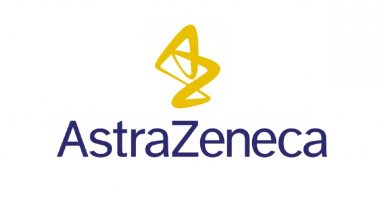London, November 23: Pharma major AstraZeneca said on Monday that an interim analysis of clinical trials of its COVID-19 vaccine in the UK and Brazil showed that it was 70 per cent effective on average, becoming the latest firm to post the vaccine trials results raising hope to contain the deadly virus.
The vaccine, developed with the University of Oxford, showed 90 per cent efficacy in one dosing regimen when the vaccine was given as a half dose, followed by a full dose at least a month later, and another dosing regimen showed 62 per cent efficacy when given as two full doses at least one month apart, AstraZeneca said in a statement. Also Read | COVID-19 Cases in US May Double Before President-Elect Joe Biden Takes Office: Study.
"The combined analysis from both dosing regimens resulted in an average efficacy of 70 per cent," it added. An independent Data Safety Monitoring Board determined that the analysis met its primary endpoint showing protection from COVID-19 occurring 14 days or more after receiving two doses of the vaccine, AstraZeneca said.
No serious safety events related to the vaccine have been confirmed. The ChAdOx1 nCoV-2019 or codenamed AZD1222 was well tolerated across both dosing regimens, it said.
The company "will now immediately prepare the regulatory submission of the data to authorities around the world that have a framework in place for conditional or early approval," the statement said.
AstraZeneca will seek an Emergency Use Listing from the World Health Organisation for an accelerated pathway to vaccine availability in low-income countries, it added.
"These findings show that we have an effective vaccine that will save many lives. Excitingly, we've found that one of our dosing regimens may be around 90 per cent effective and if this dosing regimen is used, more people could be vaccinated with planned vaccine supply,” explained Professor Andrew Pollard, Director of the Oxford Vaccine Group and Chief Investigator of the Oxford Vaccine Trial.
The vaccine was co-invented by the University of Oxford and its spin-out company Vaccitech. "Today marks an important milestone in our fight against the pandemic. This vaccine's efficacy and safety confirm that it will be highly effective against COVID-19 and will have an immediate impact on this public health emergency," AstraZeneca Chief Executive Officer Pascal Soriot said.
"Furthermore, the vaccine's simple supply chain and our no-profit pledge and commitment to broad, equitable and timely access means it will be affordable and globally available, supplying hundreds of millions of doses on approval," Soriot said.
The company is making rapid progress in manufacturing with a capacity of up to 3 billion doses of the vaccine in 2021 on a rolling basis, pending regulatory approval, AstraZeneca said. COVID-19 Vaccine Covishield May Get Emergency Use Authorisation From India in December 2020, Says Report.
"The vaccine can be stored, transported and handled at normal refrigerated conditions for at least six months and administered within existing healthcare settings," it added. British Prime Minister Boris Johnson said, "Incredibly exciting news the Oxford vaccine has proved so effective in trials. There are still further safety checks ahead, but these are fantastic results."
Health Secretary Matt Hancock also expressed excitement and said that if everything goes to plan, the UK can start rolling out the vaccines as early as next month with bulk in early 2021.
More than 20,000 volunteers were involved in the trial, half in the UK and the rest in Brazil. There were 30 cases of COVID in people who had two doses of the vaccine and 101 cases in people who received a dummy injection.
When volunteers were given two "high" doses the protection was 62 per cent, but this rose to 90 per cent when people were given a "low" dose followed by a high one. It's not clear why there is a difference, which will be analysed further.
Professor Sarah Gilbert, Professor of Vaccinology at the University of Oxford, added: “The announcement today takes us another step closer to the time when we can use vaccines to bring an end to the devastation caused by SARS-CoV-2 (COVID-19)."
Oxford will now support AstraZeneca in submitting both the interim Phase 3 efficacy data and the extensive safety data to all regulators across the world, including in the UK, Europe and Brazil for independent scrutiny and product approval, including for emergency use. The clinical trials, enrolling over 24,000 participants from diverse racial and geographical groups in the UK, Brazil and South Africa, will now continue to final analysis.
Further trials are being conducted in India, the US, Kenya and Japan and the trial team expect to have under 60,000 participants by the end of the year, the university said.
The Oxford vaccine (ChAdOx1 nCoV-19) is made from a virus, which is a weakened version of a common cold virus (adenovirus), that has been genetically changed so that it is impossible for it to grow in humans. When Will COVID-19 Vaccine Covishield, Developed by Oxford-AstraZeneca, Be Available? Adar Poonawalla Responds.
Adenovirus vaccines have been researched and used extensively for decades and have the significant benefit that they are stable, easily manufactured, transported and stored at domestic fridge temperature (2-8 degrees C), meaning the vaccine, once approved, can be easily distributed using existing medical facilities and deployed very rapidly.
The result of the latest vaccine compares with the Pfizer and Moderna vaccines, which were recently shown to be 95 per cent and 94.5 per cent effective, respectively. The Oxford University vaccine is comparatively cheaper and easier to store. According to Johns Hopkins data, there are 58,696,029 COVID-19 cases and 13,88,724 deaths across the world.
(The above story is verified and authored by Press Trust of India (PTI) staff. PTI, India’s premier news agency, employs more than 400 journalists and 500 stringers to cover almost every district and small town in India.. The views appearing in the above post do not reflect the opinions of LatestLY)













 Quickly
Quickly


